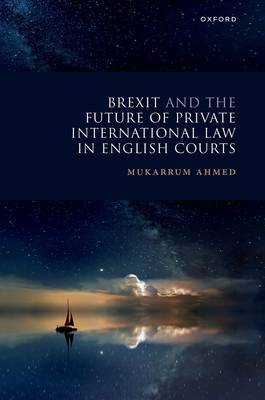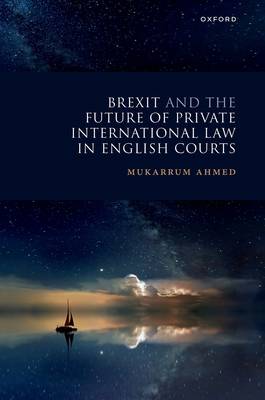
En raison d'une grêve chez bpost, votre commande pourrait être retardée. Vous avez besoin d’un livre rapidement ? Nos magasins vous accueillent à bras ouverts !
- Retrait gratuit dans votre magasin Club
- 7.000.000 titres dans notre catalogue
- Payer en toute sécurité
- Toujours un magasin près de chez vous
En raison de la grêve chez bpost, votre commande pourrait être retardée. Vous avez besoin d’un livre rapidement ? Nos magasins vous accueillent à bras ouverts !
- Retrait gratuit dans votre magasin Club
- 7.000.0000 titres dans notre catalogue
- Payer en toute sécurité
- Toujours un magasin près de chez vous
Brexit and the Future of Private International Law in English Courts
Mukarrum Ahmed
Livre relié | Anglais
111,95 €
+ 223 points
Description
In Brexit and the Future of Private International Law in English Courts, Mukarrum Ahmed discusses the impact of Brexit upon jurisdiction, foreign judgments, and the applicable law in civil and commercial matters. By providing a commentary on the principal post-Brexit changes in England, this book faces towards the future of private international law in English courts. It utilises a once-in-a-generation opportunity to analyse, understand, and reframe some fundamental assumptions about the discipline with a view to suggesting adjustments and law reform. Ahmed argues that a conscious unlearning of the central precepts of EU private international law would be detrimental to the future of English private international law. The multilateral issues that lie ahead for the discipline rely on the legal epistemology of EU private international law, which also serves as a useful reference point when comparing aspects of English private international law. Unshackled from the EU's external competence constraints, the UK will have the opportunity to play a more prominent role in the development of the Hague Conference's global instruments. A methodologically pluralist approach to English private international law may be the best route to sustain its global leadership in this field, as well as simultaneously assimilating the best private international law developments from the Commonwealth, Europe, and beyond.
Spécifications
Parties prenantes
- Auteur(s) :
- Editeur:
Contenu
- Nombre de pages :
- 240
- Langue:
- Anglais
Caractéristiques
- EAN:
- 9780192848116
- Date de parution :
- 05-08-22
- Format:
- Livre relié
- Format numérique:
- Genaaid
- Dimensions :
- 156 mm x 234 mm
- Poids :
- 503 g

Les avis
Nous publions uniquement les avis qui respectent les conditions requises. Consultez nos conditions pour les avis.






